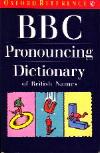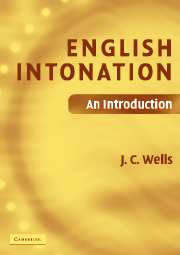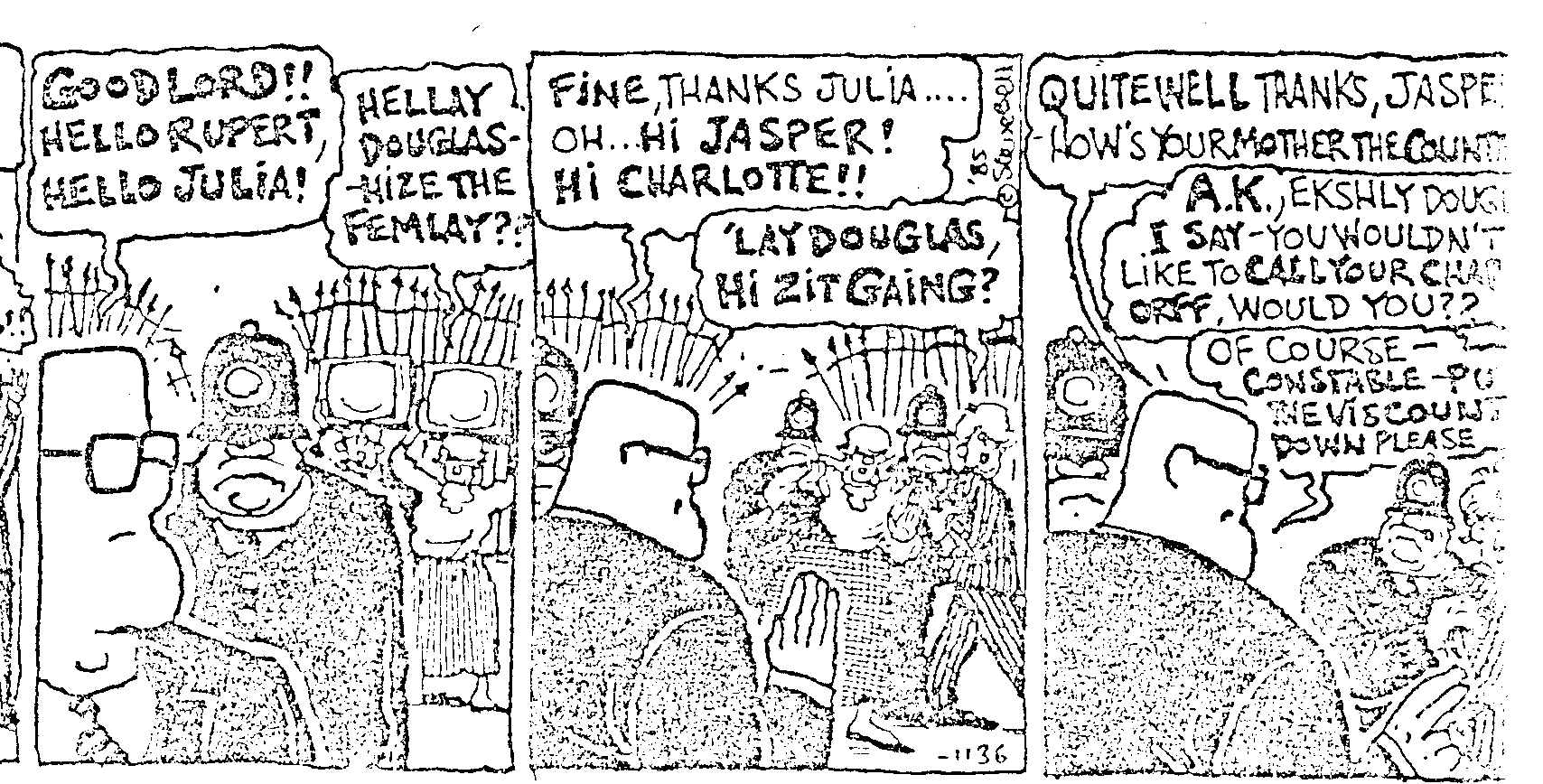Llwynywormwood
|
| For those who don’t want to attempt the Welsh version [ˌɬʊɪn ə ˈwer mud], I think — failing a recommendation from the BBC Pronunciation Unit — I would recommend the anglicization [ˌluː ɪn ə ˈwɜːm wʊd], though this does make it sound unfortunately like a loo in some sort of forest. It’ll be interesting to see what the royal affairs correspondents on radio and TV make of it.
Worse, the nearby village is Myddfai. That’s Welsh [ˈməð vai]. Graham Pointon’s BBC Pronouncing Dictionary of British Names (OUP 1990) gives a choice of /ɪ/ and /ʌ/ for the first vowel, but anglicizes it no further. What’s the betting we hear /ˈmɪd feɪ/?
| 
|
| Friday 24 November 2006
| More on the intonation of insists
In response to yesterday’s posting, Alan Cruttenden writes as follows.
“I used the term 'Insists' in my book because I deliberately wanted a fairly vague term which covered many types of preposition and auxiliary verb accenting. These include presuppositionals but many other uses which are only presuppositionals by a considerable extension of the meaning of 'presuppositional'. David Faber and I published an article some years ago in the Journal of Pragmatics (1991, 15, 265-286) called 'The accentuation of prepositions' in which we discussed examples like:
| (a) This poem describes London and the journey to London
| | (b) The rules and the interpretation of those rules
| | (c) A woman shouldn't be a politician; she should be the wife of a politician
| | (d) I like children; what I don't like is looking after children
| | (e) You keep on going on about Guyana but have you ever met anyone from Guyana?
| | (f) They're not particularly good but there are masses of the brutes.
|
In all these cases there are alternative nucleus placements which more easily fit the general rules and non-stressing of function and 'given' words , e.g on journey, interpretation ...etc (though this is not always true). The prepositional placement does a variety of things like contrasting two noun phrases 'London' and 'to London', suggesting that the preposition should be considered as a lexical item rather than just a function word, and suggesting the newness of the preposition as opposed to the givenness of the following noun. But a characteristic of them all is that the impression is given that the user is somehow showing off his sophisticated use of language; as such they are used by articulate middle-class speakers (frequently by journalists and reporters). I cannot imagine a road sweeper saying 'I hate litter and the leavers of that litter'. ”
The last point, linking this usage to social class, is a very acute one and I think probably correct. Unlike the road sweeper, I think that Alan and I could well say
I 'hate \/litter | and the 'leavers \of that litter.
Touché.
| 
|
| Thursday 23 November 2006
| Counterpresuppositional insists
One area of English intonation that is really difficult to explain is found in exchanges like this:
| A: Have you /eaten?
| B: \No, | there was 'nothing \to eat.
|
Why does B put the nuclear accent on to, a function word that appears to have virtually no meaning of its own?
This is an example of a class of utterances known as counterpresuppositionals. Here, A says something that presupposes that there was something available for B to eat. That is, A treats the availability of food as something that is shared ground (mutual knowledge) for the two participants in the conversation. B’s reply involves a rejection of this presupposition: it counters it. The supposed fact of the availability of food was not in fact shared ground: B denies that it was the case.
We know that in English it is usual to avoid putting the nucleus on a repeated item. So we don’t expect a nucleus on eat. Logically, we might expect a nucleus on nothing. But that’s not where native speakers put it. They usually put it on to (above), or sometimes, less commonly, on was, or indeed on eat:
| B: There \was nothing to eat.
| | B: There was 'nothing to \eat.
|
|
|
|
| In my book English Intonation, page 183, I give various other examples of this, including
| A: They 'want you to a\pologize.
| B: But I’ve 'no reason \to apologize.
| | A: 'Never /mind. | 'Worse things happen at /sea.
| B: We’re 'not \at sea.
|
Alan Cruttenden, in his book Intonation (CUP, second edition 1997), page 85, calls this kind of answer an insist. He says that in these “the nucleus is only rarely on a final noun, may fall on the main verb, but may also fall on classes of word not usually accented at all, in particular on auxiliary verbs, on a negator, and on a preposition immediately following copula ‘be’”.
Among his examples are the following, and Sabrina Ukmar writes to me from Buenos Aires asking about them.
| (1) | A: Did you meet the Ripper when you were in prison?
| B: But I haven’t been in prison.
| | (2) | A: I put my bag in your study because there was nowhere else to put it.
|
Re (1) Sabrina asks, “Is that always the case? I mean, cannot the verb been be stressed instead of the preposition? Would that imply a change of meaning of the sentence?” My answer is that it \/is possible to put the nuclear accent on been. But it’s also possible to put it on in, and that’s the mysterious fact that Prof Cruttenden is discussing at this point of his chapter. As to whether there is any difference in (pragmatic) meaning, I confess I find it very difficult to put my finger on what, if anything, it is.
With regard to (2), Sabrina says “I myself would have placed the nucleus on else instead. What do you think about that? Where would you place the nucleus, Mr Wells?”
What I think is that it is indeed possible to put it on else, but that I myself might well, like Cruttenden, have put it on to. I can’t really explain why.
| 


Buenos Aires
|
| Wednesday 22 November 2006
| Dictionary conventions
Having looked at the transcriptions I offered on Monday, Michael Covarrubias writes, “In your latest post on LPD additions I notice that you syllabify hoodie and statin with coda on the first syllable and no onset on the second, and that you maximize the coda on Sentamu with the [nt] cluster. I note as well that your transcription of Schmeichel uses a superscript schwa before the [l].
- What criteria best determine the coda/onset maximization?
- How might one distinguish between a syllabic [l] and the superscript schwa?”
My answer to the first bulleted question is to be found in the article ‘Syllabification and allophony’, published in Susan Ramsaran (ed.), Studies in the pronunciation of English, A commemorative volume in honour of A.C. Gimson (London and New York: Routledge, 1990), pages 76-86. In my view (which admittedly many people disagree with), syllabification should be based on maximizing not only onsets but also codas of stressed syllables. This enables one to state allophonic rules more succinctly than would otherwise be possible. So in statin, for example, the /æ/ undergoes pre-fortis clipping caused by the following /t/ in the same syllable. In Sentamu both the /e/ and the /n/ are clipped (= reduced in duration) for the same reason. My syllabification principles are also explained briefly on pages xix-xx of the current (second) edition of LPD.
The answer to the second question, too, is answered in the printed LPD. For me “əl” is an abbreviatory convention meaning “[l̩] (= syllabic l) or, less likely, [əl]”. Raised letters stand for ‘sounds optionally inserted’. So a syllabic l is one possible unpacking (the most likely one) of superscript schwa plus l. (You can tell it must be syllabic, because the syllables are shown by the spacing and there are no (other) vowels in the syllable.) By writing “ˈʃmaɪk əl” I am indicating “ˈʃmaɪk l̩ or (less likely) ˈʃmaɪk əl”. The raised-letter convention saves space. I do the same thing in words such as fence fents.
Like many lexicographers, I do from time to time complain that dictionary users won’t read the explanations in the introduction...
Michael continues, “In your transcription of chatroom I notice that you use [t] as the coda consonant. Is there a convention of transcription that avoids use of the glottal stop? Is this because it's an allophone and not a phoneme, or are you transcribing a pronunciation that does not pronounce it as a glottal stop?”
Yes, I treat the glottal stop as an allophone of /t/, and I transcribe phonemically (though perhaps we ought to say quasi-phonemically, given the various abbreviatory conventions I use; not only are there the raised letters and the italicized ones, but you can also think of the happY vowel “i” as an abbreviatory convention meaning “either /ɪ/ or /iː/”).
In many varieties of English syllable-final /t/ is indeed pronounced as [ʔ]. In BrE RP the /t/ of chatroom might be (post-)alveolar or glottal or both. Except when discussing the glottal stop, I do not use the symbol ʔ in LPD, leaving the user to infer this possibility from the fact that the /t/ is syllable-final (and not preceded by an obstruent). See the discussion on page 327.
There is a well-known difficulty with words like petrol (Michael uses the example satrap). Here you don’t normally get glottal stop plus r, but a voiceless post-alveolar affricate /tr/. Since the /t/ still causes pre-fortis clipping, and we don’t want to divide the affricate, my solution here is to syllabify as ˈpetr əl.
| 
Michael Covarrubias
|
| Tuesday 21 November 2006
| Montserrat CreoleLast week Gabriel and I were invited to sing a duet at the funeral in London of a young man from Montserrat, Gabriel’s island in the West Indies. After the service, a Montserratian I have known for many years, who like the deceased was forced to evacuate to England by the volcanic eruption of 1997, congratulated me by saying
[mi no mi no ju kudu siŋ so]
This was in the local dialect of English, Montserrat Creole. I wonder how far people unfamiliar with the dialect would have understood.
| mi | no | mi | no | ju | kudu | siŋ | so
| | I | NEG | PAST | know | you | could | sing | so
| | Me | no | me | know | you | couldoo | sing | so!
| | ‘I didn’t know you could sing like that!’
|
Unlike in Jamaican Creole, in Montserrat the past tense marker is /mi/, homophonous with the first person singular pronoun /mi/ ‘I, me, my’. And the mark of negation, /no/, is, like standard no, homophonous with the verb know.
Montserratians speak something much closer to Standard English when talking to outsiders, so I felt complimented to be addressed in dialect: it meant I was being treated as a belonger, an insider.
In just over a week I’ll be on my way there.
| 
|
| Monday 20 November 2006
| New words
Here are some headwords I plan to add to LPD if and when there is a new edition.
Unlike in Jamaican Creole, the Montserrat past tense marker is /mi/
Al Jazeera ˌældʒə ˈzɪər ə
Asbo ˈæz bəʊ
blog blɒg
broadband ˈbrɔːd bænd
celeb sɪ ˈleb
chatroom ˈtʃæt ruːm –rʊm
eBay ˈiː beɪ
hijab hɪ ˈdʒɑːb
hoodie ˈhʊd i
iPod ˈaɪ pɒd
manga ˈmæŋ gə
|
ming mɪŋ -er/s -ing
Paypal ˈpeɪ pæl
phish fɪʃ -ing
podcast ˈpɒd kɑːst -kæst
Schmeichel ˈʃmaɪk əl
Sentamu ˈsent ə muː
shalwar kameez ʃʌl ˌwɑː kəˈmiːz etc
statin ˈstæt ɪn
twoc twɒk -king
webcam ˈweb kæm
Wikipedia ˌwɪki ˈpiːd i_ə
|
And here are some I don’t think I will be adding... yet. They are taken from a newspaper article about the research being carried out by Paul Kerswill and his team (blog, 16 November), and are apparently part of London youthspeak (or perhaps that should be yutespeak or yoofspeak).
blud blʌd
brapp bræp
choong tʃʊŋ
|
cotch kɒtʃ
creps kreps
wack wæk
|
| 


Archbishop John Sentamu
|
| Friday 17 November 2006
| A plum in your mouth
On Wednesday evening I attended a publisher’s launch party for Andrew Taylor’s new book A plum in your mouth, which has come out in just nice time for the Christmas market. It is a popular account of English pronunciation, and the author, a well-known journalist, hopes it will do for pronunciation what Eats, Shoots and Leaves did for punctuation.
Since I’ve only had the book in my hands for a few hours, I haven’t yet had time to read it. But the author writes such nice things about me in his Acknowledgements, and said such nice things about me at the launch, that I have to wish the book well. It is clearly aimed at the UK native-English-speaker market, and promises ‘fascinating anecdotes, trivia and examples’. “Whether you're a Cockney Sparrow or a Scouser, this is a book you cannot afford to miss,” say the publishers, HarperCollinsEntertainment (sic).
Rory Bremner’s Foreword to the book starts with a little dialogue which English people will understand, but probably not many non-English people.
Man A: Try pronouncing the word 'a-i-r'.
Man B: Air.
Man A: Good. Now try pronouncing the word 'h-a-i-r'.
Man B: Hair.
Man A: Excellent. Now try the word 'l-a-i-r'.
Man B: Lair.
Man A: Splendid. Now put them together and what have you got?
Man B: Air, hair, lair.
Man A: Welcome to Sandhurst.
Explanation: this pokes fun at upper-class speech (U-RP). Sandhurst is the Royal Military Academy where army officers are trained. One of the stereotypical features of U-RP is a front starting quality to the GOAT vowel, roughly [eʊ], but without much backing or rounding in the second element. Thus U-RP oh can be caricatured as air, and what Man B ends up saying is Oh, hello.
Although this joke depends on equating the U-RP GOAT vowel with the mainstream SQUARE vowel, other caricaturists equate it with the FACE vowel. Here’s the cartoonist Steve Bell...

...who caricatures hello as hellay, going as gaing, and OK as AK. (He also equates the U-RP MOUTH vowel with mainstream PRICE, hence hi for how.)
| 

Andrew Taylor
|
| Thursday 16 November 2006
| London teenagers
My friend Paul Kerswill, formerly of the University of Reading but now at the University of Lancaster, writes to tell me about his latest research. With Eivind Torgersen and Sue Fox he has just presented a conference paper on ‘Innovation in inner-London teenage speech’. You can see their Powerpoint presentation.
You can read their main findings and arguments for yourself. I was struck by various things, in particular that young people in towns on the London periphery (Ashford, Milton Keynes, Reading) have less H-dropping than their elders, but more TH-fronting. They also have a lowered and backed (cardinal-4 type) TRAP vowel (this is relevant to the discussion of /æ/, 13 Nov.) and a back STRUT vowel. H-dropping is on the decrease in Milton Keynes and Reading, as you can see when you compare the speech of young people with that of the elderly; but for young people in Hull (in the north of England) it is still just as prevalent. TH-fronting is particularly favoured by young working-class males, and even more so in Hull than in the south; in London it is ‘so advanced that comparisons are no longer useful’.
There are new monophthongs in central London for FACE, PRICE and GOAT (i.e. corresponding to RP /eɪ, aɪ, əʊ/), used particularly by the ‘non-Anglos&rsquo (those of recent immigrant heritage), by the Anglos with a non-Anglo social network, and by males rather than females. “These innovatory monophthongs are centred on the inner city. They are rare outside.”
Where will it all end? (You know the answer. Things will just go on changing, as each new generation surprises the preceding one.)
| 
Paul Kerswill
|


















